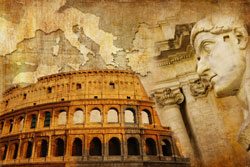 The example of the first great republic in recorded history (509 B.C. to 29 B.C.) was omnipresent in the minds of America’s founders as they created a new republic centuries later. As a consequence of their deliberations and, perhaps, the “protection of divine providence” as written in the Declaration of Independence, the United States of America, in the mind of many of the founders, was intended to be the modern equivalent of the Roman Republic. The Roman Republic ended with the infamous assassination of Julius Caesar in 27 B.C..
The example of the first great republic in recorded history (509 B.C. to 29 B.C.) was omnipresent in the minds of America’s founders as they created a new republic centuries later. As a consequence of their deliberations and, perhaps, the “protection of divine providence” as written in the Declaration of Independence, the United States of America, in the mind of many of the founders, was intended to be the modern equivalent of the Roman Republic. The Roman Republic ended with the infamous assassination of Julius Caesar in 27 B.C..
After a protracted civil war, Octavian became the first “Imperator Caesar,” or Roman emperor. The subsequent period – post-republic – of Roman dominance is known in history as the “Roman Empire.” While Rome enjoyed an additional 500 years of world dominance and internal conflict under the Caesars, history reports its disintegration in the fifth century A.D. (476 A.D.) following the successful invasion of the barbarian Germanic tribes.
Common Influences on the Founding of Each Society
While the facts of the founding of the Italian city Rome are shrouded in myth, the Roman Republic was established in 509 B.C. by the overthrow of the last Roman king (Lucius Tarquinius Superbus) and expulsion of the Etruscan theocratic government by the Latins, one of the three Italic tribes in central and southern Italy. Similarly, the “Republic for the United States of America” was birthed in a bloody revolution against the British King George more than 2,000 years later.
According to historian Carl J. Richard in “Greeks & Romans Bearing Gifts: How the Ancients Inspired the Founding Fathers,” the earlier Roman Republic heavily influenced the founders of America who shared many common fears and hopes of the earlier architects of that Republic. These included the following:
Fear of Centralized Authority
Having learned the lessons of despots and emperors, both societies attempted to establish checks and balances to avoid abuse of unchecked government power. The Romans replaced their king who served for life with a system of two consuls elected by citizens for an annual term. America’s founders created the executive, legislative, and judicial branches to diffuse potential power and abuse.
Open Societies
Rome welcomed other people – particularly its vanquished enemies – into Roman citizenship, even accepting the gods of the newcomers. Likewise, America has long been recognized as a “melting pot.”
Selfless Leadership
Rooted in agrarian societies, commitment to family and mutual citizen interdependence were basic in each society. Cincinnatus, a Roman farmer, saved the republic from invading Aequi tribes in 458 B.C. and again in 439 B.C. when a conspiracy threatened the government. In both cases, he was named dictator, but shortly thereafter resigned his commission to return to farming. George Washington, a Virginia farmer who led the fight against the British, resigned after his second term as president to return to his Virginia estate. Both men are examples of leaders who put the needs of their country before their personal interests.
Read more. . .

